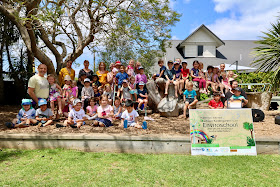The Mairtown Kindergarten community have been on an environmental journey for just over a year now to learn about and increase our environmental and sustainable practices. We have been an Enviroschool since 2018 and this week received our Bronze Enviroschool award.
We would like to thank our whānau and community for coming together to help us celebrate as this is a journey we take side by side. Your support and aroha mean everything to us and is what makes us such a close community, radiating kotahitanga and manaakitanga.
This positive movement of change is about our tamariki, whānau, neighbours, and friends and how what we do, has an influence on the people & whenua around us.
Enviroschools is a nationwide programme where early childhood centres and schools commit to a long-term sustainability journey, where tamariki connect with and explore the environment, then plan, design and take action in their local places in collaboration with their communities.
The Enviroschools kaupapa is about creating a healthy, peaceful, sustainable world through people teaching and learning together.
This is what it has looked like over the past year at Mairtown Kindergarten.
Empowered Students are enabled to participate in meaningful ways in the life of their early childhood centre or school. Their unique perspectives are valued for the knowledge and insight that they bring, and they are supported to take action for real change.
Rangatiratanga stamps given out to those who demonstrate fantastic leadership skills.
Learning for Sustainability recognises the types of teaching and learning that use connecting experiences to develop holistic and ecological perspectives, foster student enquiry, decision-making, action, and reflection, and create sustainable outcomes.
Continually giving back to Papatūānuku through using worm farms, compost bins, and local farm animals. Some times we even grow seedlings in the compost!
Māori Perspectives honours the status of tangata whenua in this land and the value of indigenous knowledge and wisdoms in enriching and guiding learning and action.
Teaching the children about where we are, who we are and how privileged we are to be entering such a beautiful ngahere before we begin our Nature Programme.
Respect for the Diversity of People and Cultures acknowledges the unique gifts, contributions and perspectives of individuals and groups, reinforcing the value of participatory decision-making and collaborative action.
Giving thanks to our entire Mairtown whānau for all they bring to our community.
Sustainable Communities act in ways that nurture people and nature, now and in the future, to maintain the health and viability of our environment, society, culture and economy.
Teaching our tamariki about how to plant, grow & prepare kai for eating as well as sharing our māra kai with whanau and our wider community.
Nga mihi nui to the Mairtown Kindergarten community for supporting us with this kaupapa. We look forward to continuing this journey to work towards our Enviroschools silver award.
- Hanna
Ka mihi ki a Rangi nui, ki a Papatūānuku, ka mihi ki te ngao o te wheiao.


























































